There are countless cryptocurrency wallets right now. This makes it tricky for beginners to pick the right one, and the risk of them compromising their assets by exposing their private keys due to a bad project is simply too much.
Knowing this very well, I have prepared a list of top cryptocurrency wallets, highlighting their features, pros and cons, and platform support. Every section also indicates CER Rating and Skynet Score, as a measure of their security posture.
- 1. Atomic Wallet
- 2. Coinbase
- 3. BlockWallet
- 4. Exodus
- 5. Zengo
- 6. MetaMask
- 7. Trust Wallet
- 8. BitPay Wallet
- 9. Crypto.com
- Show less
Please note that this article is about software wallets, and we have a different post for those interested in hardware crypto wallets.
Disclaimer: Crypto investments are risky, with the underlying asset’s value based purely on speculation. Don’t invest more than you can afford to lose. Moreover, it is not legal tender in most countries, and some have even criminalized its possession. Check your local laws before proceeding.
1. Atomic Wallet
CER Rating: DDD, Skynet Score: Under Evaluation
Atomic Wallet is a self-custodial wallet where you can buy, swap, stake, and manage your entire crypto portfolio.
You can use this wallet on your web browser and as a native application for Windows, macOS, Linux, iOS, and Android. Atomic Wallet also has a Chrome extension, making it available with just a web browser.
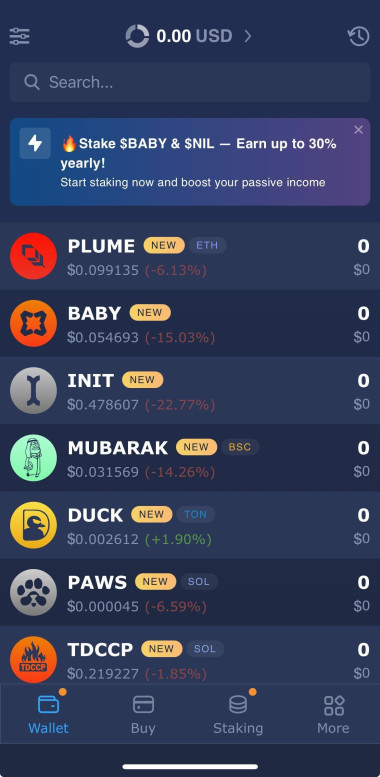
Atomic Wallet Features
- Supports over 1200 crypto assets
- Native staking with up to 20% APR
- 20+ Currencies support across over 100 countries
- Over 100 crypto pairs for swapping
- Backup and restore with a 12-word phrase
- 24/7 live chat and email support
Pros
Self-custodial wallet
Decent cross-platform presence
Buying, staking, and swapping all at one place
Cons
Poorly rated on Trustpilot
2. Coinbase
CER Rating: AAA, Skynet Score: 78.92
Coinbase Wallet is your gateway to crypto, NFTs, and the DeFi space. It’s backed by a leading cryptocurrency exchange, Coinbase, which is currently the third largest by trading volume.
You can download this wallet for iOS, Android, and Chrome browser, or use it as a web app.

Coinbase Wallet Features
- Supports buying crypto in 120+ countries
- Compatible with Ledger hardware wallets
- 12- Word seed/recovery phrase
- Preconfigured support for 10 blockchain networks (Ethereum, Solana, etc.)
- Self-custodian wallet with additional security options such as biometric authentication
- Can connect with the primary Coinbase app
Pros
Excellent crypto coverage, including all ERC-20 and EVM-compatible tokens
Crypto-to-crypto trading supporting seven networks (Base, BNB, Ethereum, etc.)
Can mint NFTs within
Cons
Lacks native apps for desktop platforms, such as Windows and macOS
Parent company, Coinbase, suffered a breach in 2025
3. BlockWallet
CER Rating: NA, Skynet Score: 78.10
BlockWallet is an open-source self-custodial crypto wallet with superior dApp management. Moreover, it comes with built-in cybersecurity against hacks/scams and has privacy measures to protect users from unwanted snooping. It has been independently audited by multiple security firms, including Cure53, Least Authority, and X41 D-Sec.
You can use this wallet from your browser directly as a web app, or use its extension for Firefox.
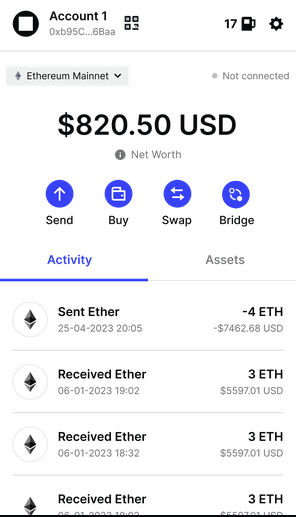
BlockWallet Features
- Compatible with Trezor, Keystone, and Ledger wallets
- In-built phishing protection with customizable artwork on every sensitive screen
- Token swap with search and compare across multiple DEX platforms
- Native blockchain bridge execution without 3rd-parties
- Real-time gas price tracker for Ethereum
- Privacy proxy to hide IP address from node providers
- Revoke/restore token allowance from dApps at will
- Supports adding EVM-based chains with a few clicks
Pros
Excellent security features
Native bridging and gas tracking
Good hardware wallet support
Cons
No mobile apps for now
Mandates KYC
4. Exodus
CER Rating: AAA, Skynet Score: 83.19
Exodus is for anyone eyeing a wholesome web3 experience. You have buying/selling, staking, swapping, dApps, and NFTs, making Exodus a perfect tool to do it all in crypto.
Exodus has mobile (iOS and Android) and desktop (Windows, Mac, and Linux) apps. You can also deploy Exodus as an extension for Chrome and Brave.
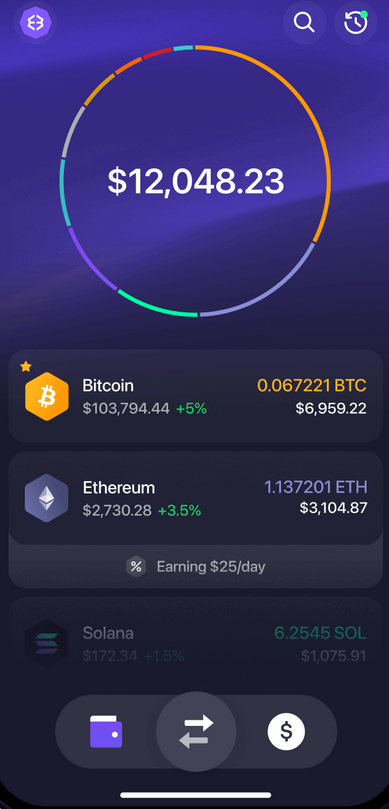
Exodus Features
- Buy and sell over 1 million assets from 12 networks
- Compatible with Trezor and Ledger
- Native staking with up to 16.45% APY
- 60k Swap pairs across 50+ networks
- Wallet-as-a-service for enterprise use cases
- Fiat on and off-ramps
- Support crypto, dApps, and NFTs
- 12-Word backup/recovery phrase
Pros
Ease of use
Cross-platform presence
24/7 Chat support that got many thumbs up on Trustpilot
5. Zengo
CER Rating: AAA, Skynet Score: 84.76
Zengo is a powerful, noncustodial crypto wallet with advanced features such as account transfer, spam filter, and theft protection.
Unlike its peers, Zengo ships in two variants. One is free, and the others cost $129.99/year with monthly and annual billing cycles. While the free one, Zengo Essentials, is perfectly capable for a beginner, it’s the vastly superior “Pro” that will attract enthusiasts.
Zengo has apps for Android and iOS.
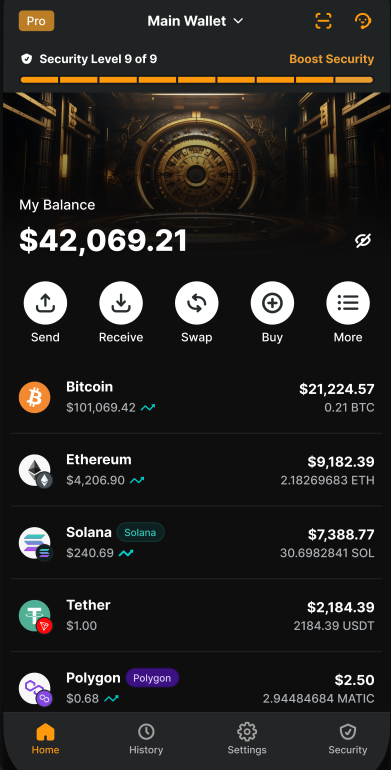
Zengo Features
- Buy, sell, swap, and stake
- Support 380+ cryptocurrencies, dApps, and NFTs
- Multi-party computation (MPC) in place of seed phrase
- Recovery based on email, facial scan, and recovery file
- Host up to five different unique wallets
- Protocols for legacy transfer to a nominee
- Ethereum staking to earn up to 4% annually
- Built-in web3 firewall
Pros
No hacks since its inception in 2019
More secure than seed phrase-based wallets
24/7 Support
Highly rated on G2 and Trustpilot
Cons
Most features are paywalled
No desktop apps currently
Lacks support for hardware wallets
6. MetaMask
CER Rating: AA, Skynet Score: 87.54
MetaMask is one of the most popular self-custodial crypto wallets. This allows you to transact with a wide range of payment channels, such as credit & debit cards, mobile payment platforms, bank transfers, and more, including location-specific channels.
MetaMask is available as a mobile (iOS and Android) and web app, and extensions for popular browsers, including Chrome, Firefox, Brave, Edge, and Opera.

MetaMask Features
- Buy, sell, and swap crypto, trade NFTs, and connect to dApps
- Compare tons of aggregator services for the best rates
- Compatible with Ledger, Trezor, Keystone, D’cent, and more hardware wallet providers
- Swapping thousands of tokens across 10 networks
- MetaMask card to spend crypto directly in select regions, including the USA, the United Kingdom, the European Union, Switzerland, and Brazil
- Liquid, pooled, and validator Ethereum staking
- Community-built extensions (Snaps) for added functionality
- 24/7 Support in 130+ languages
Pros
Outstanding hardware wallet compatibility
Real-time phishing protection
Crypto payments in real time
Cons
Very poorly rated on Trustpilot
7. Trust Wallet
CER Rating: AAA, Skynet Score: 85.24
Trust Wallet is from the top cryptocurrency exchange (by trading volume), Binance. This means, you can expect top-notch token support and a variety of payment methods. Moreover, this platform has been extensively audited and is ISO certified.
You can give it a try via its mobile apps (iOS and Android) and browser extensions (for Chrome and Brave).

Trust Wallet Features
- Buy, sell, and swap crypto, manage NFTs, and interact with dApps
- Access 10 million crypto assets across 100+ networks
- Stake 24+ coins to earn up to 24.44% APY
- Support for 110+ fiat currencies
- Independent audits from Cure53, Certik, Halborn, Kudelski Security, and Quantstamp
- Connects to top NFT marketplaces, including Open Sea, Rarible, Solanart, and Axie (infinity)
- Option to buy crypto with cash
Pros
100s of fiat on-ramps and cash-for-crypto
Binance heritage translates into exceptional token support
Cons
Its users have suffered phishing attacks
Very poorly rated on Trustpilot
8. BitPay Wallet
CER Rating: A, Skynet Score: 73.97
BitPay is an entirely open-source offering, and one of the few wallets that managed to implement two-factor authentication along with self-custody. Another BitPay USP is that it allows you to pay tons of brands and retail outlets directly with crypto.
You can try this with BitPay apps for Windows, macOS, iOS, and Android.
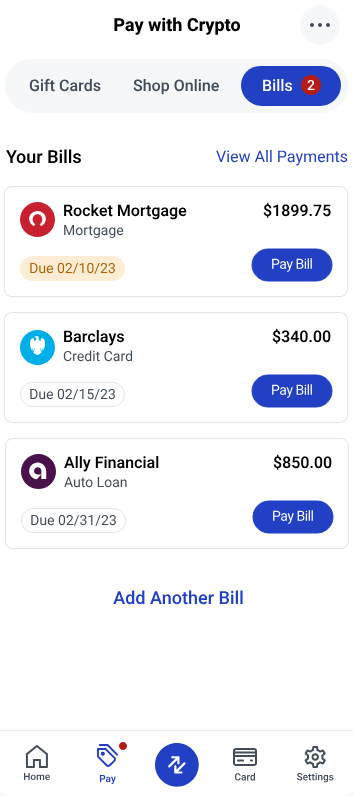
BitPay Wallet Features
- Buy, HODL, swap, and pay with over 300+ crypto assets
- Option to pay with crypto to over 250+ brands and retailers
- Support for multiple payment channels, including cards, PayPal, bank transfers, Apple Pay, Google Pay, etc.
- Biometric authentication, encrypted passwords, and multi-sig (optional)
- HODL pay to loan against assets and spend within the BitPay network
Pros
Multiple pay-with-crypto options
Excellent security posture
Cons
Very poor Truspilot ratings
KYC required to use the platform
9. Crypto.com
CER Rating: NA, Skynet Score: 87.17
Crypto.com has two different wallets, featuring self-custody and centralized key management. The former is named Onchain, and the latter is simply Crypto.com App.
Please note that the following sections mainly cover the primary Crypto.com App, unless otherwise specified. You can get it as mobile apps for iOS and Android or use it in a web browser.
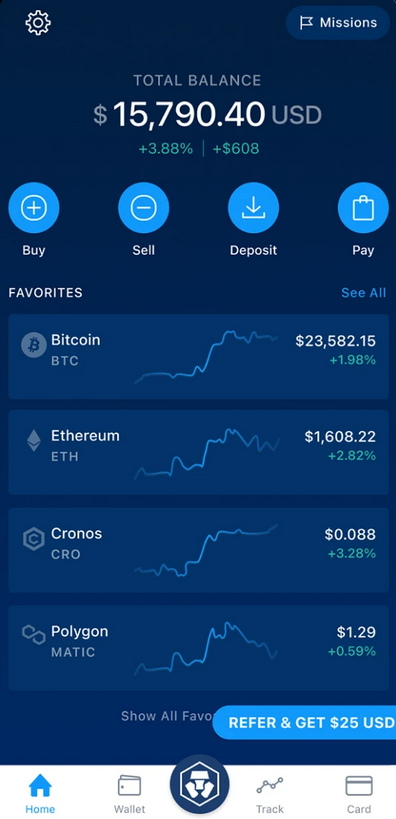
Crypto.com Features
- Stake 25+ coins to earn up to 13.74% APR
- Enroll in Crypto.com’s Earn with 21+ cryptocurrencies to get up to 30% p.a. in rewards
- Pay with crypto at over 300k outlets
- Buy and sell NFTs from top creators
- Buy 400+ cryptocurrencies with USD
- Supports hardware wallet providers, such as Ledger and Trezor
Pros
Option to go for centralized or self-custody
Zero-fee deposits when using ACH, wire, and Apple/Google Pay
Real-world crypto payments
Cons
Targeted with a $34 million hack in 2022
Subpar Trustpilot ratings
Honorable Mentions
Here’s a list comprising more crypto wallets you can try.
- Armory: Supports cold storage and multi-sig
- Blockstream: Multilingual wallet primarily made for Bitcoin
- Coinomi: Cross-platform presence and the ability to manage 1770+ crypto assets
- Proton Wallet: A Bitcoin wallet from a leading user privacy firm, Proton.
What is Crypto Wallet?
A crypto wallet is a computer program or device created to safeguard a user’s private key, which helps them to access their assets stored on a blockchain.
So, unlike traditional wallets, a crypto wallet does not hold any (crypto) currency. They are just a gateway to crypto assets stored somewhere else, which is a blockchain network in this case.
Crypto Wallet App vs. Hardware
There are two generally two ways to store private keys: crypto wallet apps and hardware (or cold) wallets.
Crypto wallet apps are software programs that you can get for popular desktop and mobile platforms. They are generally free (with a few exceptions, such as Zengo Pro).
While they are generally good at what they do, they remain sitting ducks in the case of cyberattacks, such as a data breach or malware attack. This becomes especially dangerous in the case of centralized key management—one entity managing keys for all its users. However, even self-custodial wallet users have been the target of cyberattacks, such as malware infection and social engineering.
Hardware wallets put those qualms to rest. These wallets don’t remain internet-connected the whole time, which means fewer chances of getting attacked. Moreover, you physically approve transactions with a hardware wallet, similar to signing a check.
On the downside, some hardware wallet come with displays so small that you can’t see all the transaction details, making you blind sign. And the biggest of all, hardware wallets aren’t free. Based on features and providers, they may range from tens of dollars to hundreds.
Ultimately, pro users end up with a hybrid setup. A crypto wallet app in conjunction with a hardware wallet. This enables them to have a more user-friendly experience (of a crypto wallet) app enhanced with a better security posture (of a hardware wallet).
-
 EditorUsha, the editor-in-chief of Geekflare, is a tech-savvy and experienced marketer with a Master’s degree in Computer Applications. She has over a decade of experience in the tech industry, starting as a software engineer and then moving into digital marketing and team management.
EditorUsha, the editor-in-chief of Geekflare, is a tech-savvy and experienced marketer with a Master’s degree in Computer Applications. She has over a decade of experience in the tech industry, starting as a software engineer and then moving into digital marketing and team management.


